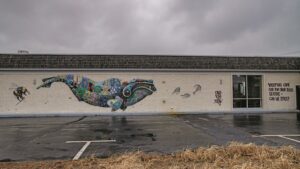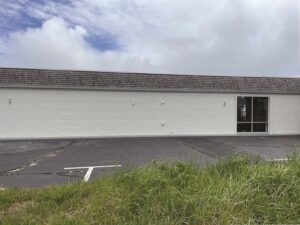PROVINCETOWN — The muralist Louis Masai was on his way to install a show in Los Angeles in May 2017 when he stopped for a brief stay here. He left in his wake a patchwork right whale on an outside wall of the Harbor Hotel on Commercial Street in the East End. The every-color painting took Masai less than two days to create.

Masai’s whale mural recently vanished as quickly as it had appeared.
Unlike many local residents, the artist is unperturbed. “I think my work should always be disappearing,” he says.
Masai makes art focused on endangered species — bees, especially, but “everything linked to biodiversity collapse or climate change,” he says. In that sense, the mural’s transience captures something essential about his message. Masai considers his work “a call to action.”
In the case of his Provincetown right whale (which was trailed by a bee), “We wanted to highlight that this creature has been in the ocean since before humans were on the planet, and yet they’re disappearing,” Masai says. He notes that fewer than 350 right whales remain worldwide.
“They have been coming into harbors more emaciated,” which he says has to do with the proliferation of plastic in the ocean and its effects on their digestion. He says that if he were to paint the mural again, it would be filled with imagery linked to the hazards endangering whales, like fishing nets and plastics.
Masai says he has been a vegan for 10 years. He is based in the coastal town of Margate in southeastern England. There, like in Provincetown, seafood is popular. Masai finds it ironic that “people are complaining about a mural of a whale being removed and yet they’re sitting down and eating fish.”
Masai’s 2017 right whale portrait was sponsored by Appearances: Provincetown Green Arts Festival, an eco-arts jubilee that ran from 2011 to 2018. Co-founder Tina Trudel called the celebration a “labor of love.”
Organizers pooled frequent-flier miles to pay for Masai’s airfare from the U.K. The Harbor Hotel wall was available.

“People donated money, time, food, and space” for the visit, said Lisa Sette, who had been following his work for years and volunteered at the festival. Over the course of Masai’s two days of spray-painting, local residents stepped up to help, responding to Masai’s “preferences for nozzle types and colors,” Sette recalls.
Masai was not aware of his work’s fate until an artist friend passed through Provincetown and let him know. Masai was unfazed: “It’s public art,” he says. “I don’t own the wall.”
The Plymouth-based hotel management company Linchris has owned the wall since 2018, when it purchased the Harbor Hotel. It was whitewashed in May as part of the company’s capital project plan, according to Linchris President Bob Anderson. “That wall is going to have a bunch of holes in it because there’s going to be windows in that side of the building,” Anderson said. He added that the room inside that wall hasn’t been operational and “is kind of like a dungeon.” The whole exterior of the building is being repainted, said Anderson, to “keep the hotel in good shape.”
The mural’s demise provoked more than 200 social-media comments expressing indignation, mourning, and attempts to memorialize the work. The mural’s whitewashing “unfortunately parallels the broader sociocultural response to climate change and humanity’s role in the environmental crises we face,” wrote Appearances co-founder Dorothy Palanza in an email to the Independent.
Shortly after Masai painted the mural, the then-owners of the hotel contacted him with a business proposition: they wanted to merchandise T-shirts and totes printed with a replica of the whale. “I said, ‘Absolutely not,’ ” Masai says. “Public art is public art. It’s for free.”
His most recent mural, a 90-by-60-foot masked black bear he painted in Houston, is called We All Wear the Mask but How Long Will It Last. That patchwork ursid work is a commentary on faddish responses to environmental crises — like almond milk. It’s seen as an eco-conscious alternative to cow’s milk, but almond farms require pesticides and are detrimental to bee populations. The West Coast is home to almond monoculture, which is “one of the most disastrous things,” Masai says.
Since the right whale mural was whitewashed, community responses have varied. Sette has her fingers crossed for pentimento. “My hope is that the mural’s color and shape will bleed through as the white fades,” she says.
The whitewashing sent waves of nostalgia across the Atlantic.
Many view the disappearance of the mural as an example of corporate disregard for climate change and art. But Masai says he has bigger fish to fry — or rather, to keep from the frying pan. “People are making this much of a fuss about a painting of a right whale disappearing,” he says. “How about they care more about the real ones disappearing? Get me a bigger wall, a better wall, and let’s go paint another mural.”



